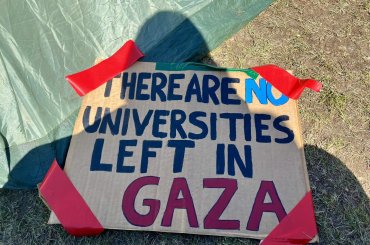As I read through Phil Weiss’s superb reports on Jewish settlers in West Bank Palestine (Part 1 and Part 2), I experienced an eerie sense of familiarity. From 1978 to 1983 I lived in southern Africa, writing articles and then a book about the struggle against apartheid. The people Weiss has just described so vividly reminded me of many of the white South Africans I met back then.
The resemblance is more than an attitude of colonial superiority. Beyond that, I recognized in Weiss’s settlers a similar feeling of self-confidence, the conviction that although the outside world could criticize all it wanted, no one was going to taken any serious actions to disturb their lives.
The great South African black poet Dennis Brutus once told me an anecdote that summed up this smug view. Brutus, who passed on in 2009, was the man who encouraged me to go to southern Africa and see for myself. He had been imprisoned on Robben Island in the 1960s, alongside Nelson Mandela and other national leaders. “One day one of the white warders approached,” Brutus said in his mellifluous voice. “He said, ‘Brutus, you seem like an intelligent man — why do you fight against a system that you will never be able to change?’ He was a decent sort, so I answered, ‘And why do you think you will keep dominating us forever?’ He answered simply, ‘Because America will never stop supporting us.'”
The same self-confident attitude shines through in Weiss’s reports. The settlers are absolutely certain the Israeli government will never uproot them, and behind that is the unspoken conviction that the United States will never put significant pressure on Israel.
South Africa’s negotiated transition to a non-racial democracy in 1994 and Mandela’s election to the presidency were true miracles. Sanctions — the BDS of its day — did put economic pressure on the apartheid regime, as international banks refused to roll over loans and investment started to dry up. But sanctions were vastly more important because they eroded the morale of white South Africans, who realized that the rest of the world was no longer going to stand behind them.
Just as with the debate over BDS today, back then the discussion about anti-apartheid sanctions sometimes got sidetracked, such as about what kind of enterprises to boycott. Dennis Brutus’s white warder acquaintance was not paying attention to such details. Only when he recognized that the rest of the world was truly reducing its support did he let his political leaders negotiate a settlement.



James North- Are there one or two books or magazine articles that one could read to determine what were the primary factors in de Klerk’s thinking?
When you write, “But sanctions were vastly more important because they eroded the morale of white South Africans, who realized that the rest of the world was no longer going to stand behind them. ” i do not think that this really would work in Israel, where eroding the morale will not work. The civil (Jew versus Jew) unrest that would result from the removal of the settlers from the West Bank is a far greater and more immediate danger to most Jewish Israelis than “realizing that the world was no longer going to stand behind them”. If and when the United States , specifically the Democratic party, listens to its grass roots, and decides to remove all support from Israel unless Israel leaves the West Bank (or removes its settlers from the West Bank) then it will be a question of survival and then the civil unrest of Jew versus Jew will seem worthwhile so as to continue to survive. But merely realization that the world is against them will not work. (The world is always against us no matter what we do, is the retort.)
i do not think that this really would work in Israel, where eroding the morale will not work. The civil (Jew versus Jew) unrest that would result from the removal of the settlers from the West Bank is a far greater and more immediate danger to most Jewish Israelis than “realizing that the world was no longer going to stand behind them”.
James will correct me if I’m wrong, but I think South Africa, at the time, was far more isolated and self-sufficient than Israel is. In that sense, the bravado of those Israelis who have been calling for a “counter-boycott” of Europe (Israel’s largest trading partner, scientific and cultural partner, and general frame of reference), or even “punishing” the EU and individual European countries is as ludicrous as it is insane..
When I was travelling in Europe in the ’80s, I met a white South African who told me that it was absolute hell to visit Europe (before the days of Schengen and open borders) on a South African passport. She described being detained, harassed and harangued at every single border. Do you think something even remotely like that would not have an effect on Israelis, so many of whom consider Europe their stomping ground? Israel can already be a very claustrophobic place. What would happen if it were to become even more so?
Latest from Norman Finklestein`s blog:
http://normanfinkelstein.com/2016/01/30/israel-uber-alles-sieg-heil/
Don`t you just love these cuddly compassionate Light unto the Nations Land of Creation IDF low life thugs.
The world is seeing what is going on in this little fascist cult colony in a way that was simply not possible up until even a decade ago and and in due course just as with South Africa isolation,sanctions and travel bans will follow as surely as night follows day.
BOYCOTT UGLY APARTHEID ISRAEL
SUPPORT BDS
TELL YOUR FAMILY AND FRIENDS ABOUT BDS
As I watched this video, I wanted to scream.
http://normanfinkelstein.com/2016/01/30/israel-uber-alles-sieg-heil/
Fascism is alive and well!!
“Meanwhile since neither Hamas nor Fatah agrees with your approach, it is mostly useful as a thought experiment rather than something practical. ”
It’s not obvious to me which specific “approach” is at issue here, but actually that’s good because my comment is a general one: Believing that actions contemplated by other governments, or by individuals anywhere on the globe, are somehow contingent on “agreement by Hamas and/or Fatah” is to miss the point entirely.
Individuals, and to some degree governments, are able to recognize injustice and oppression and take unilateral action against them irrespective of other third parties’ desires or approvals. In the instant example, many of us are fully aware of Hamas’ and Fatah’s shortcomings and imperfections. We neither expect nor require any green lights from them. Our concern is for the Palestinian people as a whole, not their governmental entities per se.
We’ve initiated, and will continue, (eg) BDS activities regardless of their approval, or that of our own governments — indeed, even with the overt disapproval of our own governments, as for example the numerous anti-BDS bills now wending their way through US state legislatures — because it’s the right thing to do.
Of course, we will continue trying to convince our respective governments of the righteousness of our cause. But many of us consider ourselves world citizens first and foremost. And we will work together with others of our kind to bring about justice for individuals and peoples wherever it’s required, without much regard for the opinions of whatever governmental entities are involved.